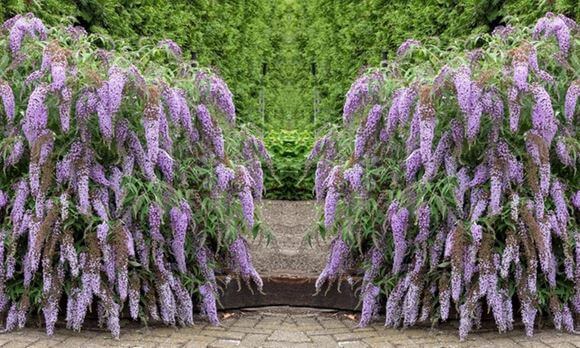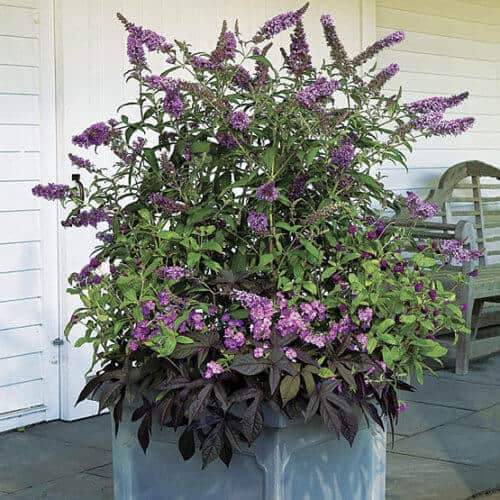Gardens and dogs can both be a great pleasure for homes. They are both beautiful, adding to the liveliness of the home atmosphere.
But not all garden plants can coexist well with dogs. Some plants could be a hazard to pets and can even be lethal.
Could the Buddleia plant be one of these?
Since dogs typically chew on plants, sometimes playfully or as a reaction to stress, there is a real chance of them getting exposed to poisonous plants.
So, before you dash off to shop for some Buddleia, let’s find out whether a buddleia garden will sit well with your feline friend.
What is Buddleia?
Buddleia davidii, also known as butterfly bush, summer lilac, or orange eye, is a flowering plant species that originated in China.
They are valued worldwide for their ornamental qualities which have made them popular with gardeners.
They have spiky blooms with stunning colors that can range from purple, red, or pink.
Buddleia flowers produce attractive nectar which makes it the favorite of many butterfly species.
Gardeners like the fact that this plant attracts many butterflies to their gardens, so they make it their preferred choice.
Is Buddleia Poisonous To Dogs?

The short answer is: Buddleia davidii is not poisonous to dogs.
It doesn’t contain any known poisonous compound that affects dogs.
In fact, the plant is not on ASPCA.org’s list of dog toxic plants and is listed as a non-toxic alternative by many major canine publications.
Additionally, Buddleia is neither edible to dogs nor do dogs get attracted to it.
Yes, despite its fragrant odor and bright flowers which appeal to humans and other animals, dogs are not attracted to buddleia.
This contrasts with other popular garden plants like basil or bamboo which dogs get attracted to and play with.
Buddleia is also not poisonous to other animals such as cats, livestock, horses, or other domestic pets. They also pose no hazards to children or humans.
However, there isn’t only one type of Buddleia. They are actually more than 140 different species of buddleia which opens the possibility of them having different properties, including toxicity.
For example, the University of Florida’s Cooperative Extension Service has singled out the less common species Buddleia Asiatica (dog tail) as toxic to humans.
Remember that if a plant is known to be hazardous to humans, it may be toxic to animals as well.
So, since Buddleja Asiatica is toxic to humans, it may be toxic to animals as well, including dogs.
Many other buddleia variants such as Buddleia globosa, Buddleia officinalis, Buddleja paniculata, and many others also exist.
But there isn’t any scientific research or resourceful literature about their toxicity, especially with regard to dogs.
To be on the safe side, stick to planting Buddleia davidii in your yard while avoiding all other buddleia species.
Read: Is Monkey Grass Poisonous To Dogs?
Butterfly Bush Vs Butterfly Weed
Butterfly Bushes (Buddleia davidii) and butterfly weeds (Asclepias tuberosa) have similar names, which make it easy to confuse them. They are also both favored by butterflies hence their common names.
However, the two plants are different…
The butterfly bush is a large, woody, deciduous shrub with beautiful lilac-colored flowers. (Some cultivars may have white, pink, dark purple, and even yellow flowers).
It is invasive in many areas and grows in the US Department of Agriculture (USDA) hardiness zones of 5-9.
On the other hand, butterfly weed is a short, herbaceous perennial milkweed with bright orange flowers. (You may also find cultivars with white or rose-colored flowers).
It is native to eastern North America and grows in USDA zones of 3-9.
But the most important aspect to a dog owner when it comes to knowing the differences between these two plants is their safety around pets.
Unlike butterfly bush, which we have established as safe for dogs, butterfly weed is very toxic.
In particular, it contains galitoxin and cardiac glycoside toxins, which makes its consumption toxic to pets and other animals—in moderate to large amounts.
If dogs ingest any of its parts (petals, flowers, or leaves), it leads to a wide range of side effects, including fever, itching, stupor, bloating, diarrhea, drooling, and vomiting among others. When consumed in excess, it can even lead to death.
If you are planning to include butterfly bush in your garden or lawn, therefore, ensure that you buy the right seeds for the sake of your pup.
Growing the wrong plant puts your dog and family members at risk of being exposed to poisonous plants.
Conclusion
Dog owners have no reason to worry about having both dogs and buddleia plants in the same environment.
They are pet-friendly plants that add to the pleasantness of their homes without harming animals.
If you have the twin passion for dogs and gardens (and also love swarms of butterflies!), the butterfly bush or buddleia is your best shot.
As an Amazon Associate, we may receive a small commission from qualifying purchases but at no extra cost to you. Learn more. Amazon and the Amazon logo are trademarks of Amazon.com, Inc, or its affiliates.



